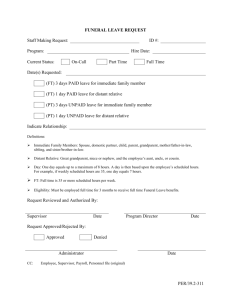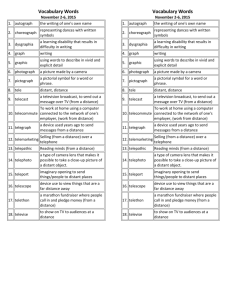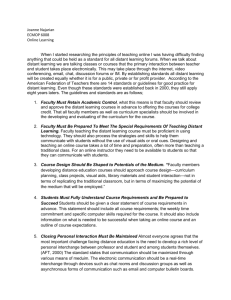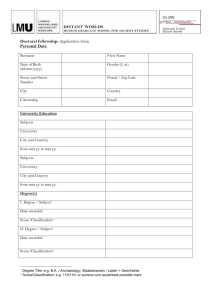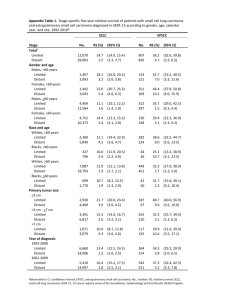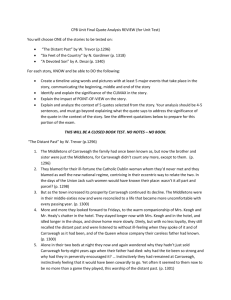Procedures for the Registration of Independent Distant Students
advertisement
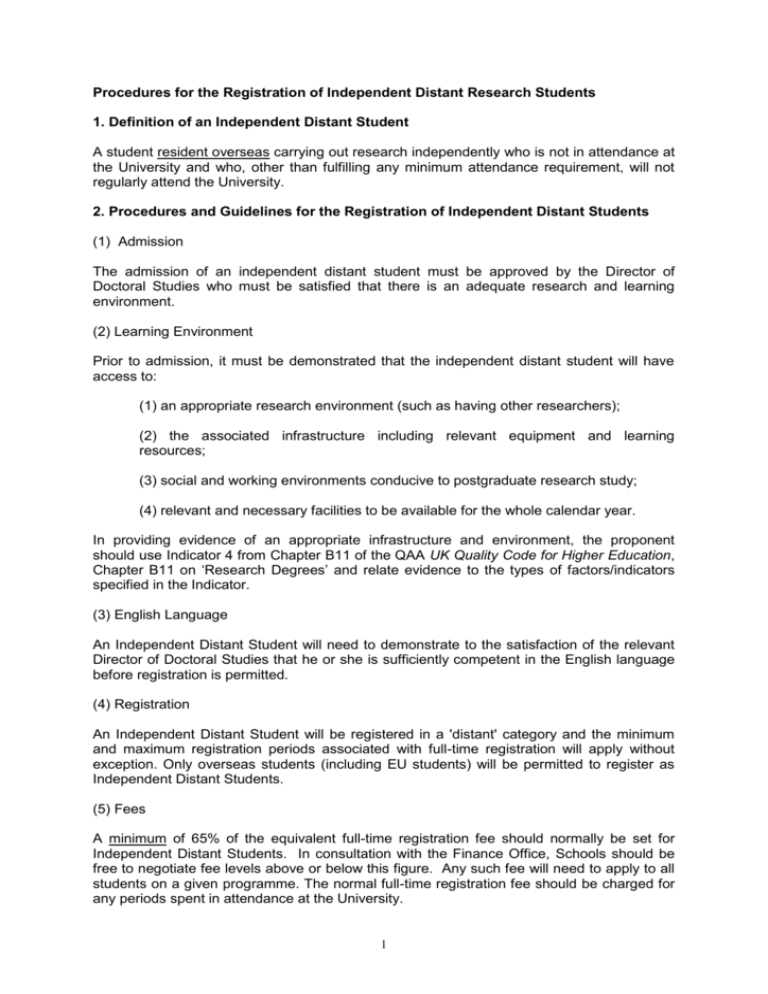
Procedures for the Registration of Independent Distant Research Students 1. Definition of an Independent Distant Student A student resident overseas carrying out research independently who is not in attendance at the University and who, other than fulfilling any minimum attendance requirement, will not regularly attend the University. 2. Procedures and Guidelines for the Registration of Independent Distant Students (1) Admission The admission of an independent distant student must be approved by the Director of Doctoral Studies who must be satisfied that there is an adequate research and learning environment. (2) Learning Environment Prior to admission, it must be demonstrated that the independent distant student will have access to: (1) an appropriate research environment (such as having other researchers); (2) the associated infrastructure including relevant equipment and learning resources; (3) social and working environments conducive to postgraduate research study; (4) relevant and necessary facilities to be available for the whole calendar year. In providing evidence of an appropriate infrastructure and environment, the proponent should use Indicator 4 from Chapter B11 of the QAA UK Quality Code for Higher Education, Chapter B11 on ‘Research Degrees’ and relate evidence to the types of factors/indicators specified in the Indicator. (3) English Language An Independent Distant Student will need to demonstrate to the satisfaction of the relevant Director of Doctoral Studies that he or she is sufficiently competent in the English language before registration is permitted. (4) Registration An Independent Distant Student will be registered in a 'distant' category and the minimum and maximum registration periods associated with full-time registration will apply without exception. Only overseas students (including EU students) will be permitted to register as Independent Distant Students. (5) Fees A minimum of 65% of the equivalent full-time registration fee should normally be set for Independent Distant Students. In consultation with the Finance Office, Schools should be free to negotiate fee levels above or below this figure. Any such fee will need to apply to all students on a given programme. The normal full-time registration fee should be charged for any periods spent in attendance at the University. 1 6. Attendance An Independent Distant Student is required to spend a minimum period of one term at the University during the course of his or her studies. The Director of Doctoral Studies may specify a longer attendance period, depending on the requirements of the research programme. A provisional timetable for completion of the required period of attendance should be agreed at the outset by the student and the supervisor and be approved by the Director of Doctoral Studies. 7. Research Supervision Arrangements for the supervision of Independent Distant Students must adhere to the Procedures for the supervision of independent distant research students (see Appendix 1 below). Schools must demonstrate this in any submission to the Doctoral School Committee. Schools will submit periodic reports to the Doctoral School Committee on the number of registered Independent Distant Students. 8. Development of research and other skills The proponent must establish to the satisfaction of the Director of Doctoral Studies that the independent distant student can be provided (by the University or other institutions) with appropriate opportunities for personal and professional development commensurate with the University’s Researcher Development Programme. Appendix 1 Procedures for the supervision of independent distant research students The following procedures are designed to ensure that the supervision of Independent Distant Students reflects the principles of the University’s approved Code of Practice for Research Degree Programmes. Directors of Doctoral Studies must ensure that any arrangements for the supervision of Independent Distant Students adhere to these procedures. 1. Number of Students The maximum number of Independent Distant Students that a supervisor may supervise at any given time is two. 2. Frequency of Supervision As a minimum, the main supervisor should meet the Independent Distant Student at least once each year and communicate at least monthly by other means to discuss the research project. Each School or Centre should have pre-specified, appropriate back-up supervisory arrangements in place (in case these become necessary for whatever reason). 3. Academic Direction of the Research Project/Supervision Arrangements The main supervisor is responsible for establishing at the beginning of the student’s research programme a satisfactory framework for supervision, including arrangements for meeting with the student, and, if the student is jointly supervised, the relative participation of the two supervisors. 2 The supervisor’s roles and responsibilities are as set out in Responsibilities of Research Degree Supervisors in the University’s Code of Practice. 4. Induction Schools should ensure that arrangements for induction are made and that students receive copies of these procedures, and the University’s Code of Practice, at induction. 5. Monitoring of Progress (1) Annual Progress Reports and Annual Review Meetings As required under the University’s Code of Practice, supervisors and students should submit to Directors of Doctoral Studies (or nominees) written Annual Progress Reports (students should have the right to see and challenge the report submitted by their supervisors). Each School or Centre should have a mechanism in place for pursuing any unresolved problems arising from the Report. Following submission of the Report, students should have a concrete idea of how the research is progressing, definite objectives for the coming year and a timetable for achieving the objectives. (2) Informal Monitoring Each School must have procedures in place for ensuring that both student and supervisor are content with progress and whether, in the estimation of both, the work is likely to be completed within the maximum registration period permitted. 6. Other Procedures Arrangements for procedures for transfer from MPhil to DPhil, request for a change of supervisor, complaints and appeals procedures should follow the text set out in the University’s Code of Practice. 3
